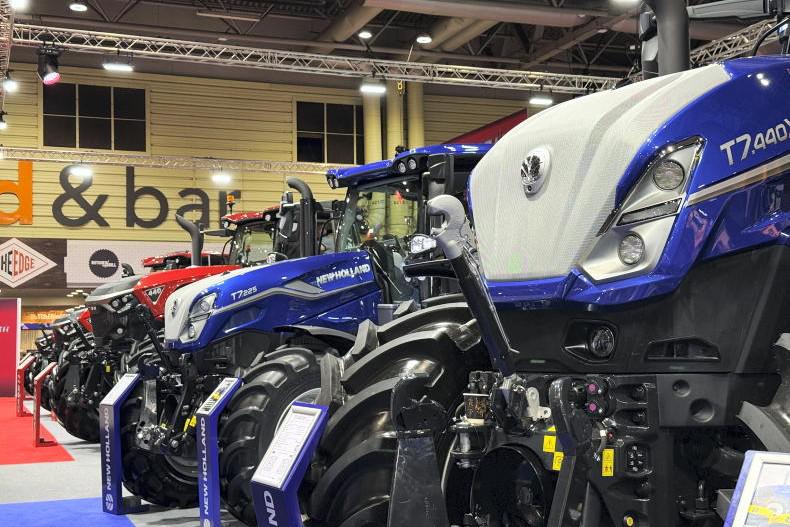Is hiring an extra tractor for a six to eight-week period a more feasible approach for the busy contractor during the silage season or for the tillage farmer during the harvest? With margins as tight as ever, this is the question farmers and contractors need to ask themselves.
A number of firms around the country offer tractors for short-term hire. Short term hire can provide the busy farmer/contractor with access to another tractor or increased power, as the seasonal demand occurs.
Some farmers/contractors avail of tractor hire to access more horsepower for short-term seasonal work such as drilling, cutting silage or harvesting etc.
In some cases, there is no use for this extra horsepower at other times of the year leaving the option of hire attractive along with peace of mind from a reliability point of view when uptime is paramount.
Know your costs
Each business will vary, but hiring a tractor can be a short-term solution to a short-term problem.
A new tractor is a fixed asset and will quickly initially depreciate in value. Many contractors can justify running some new tractors, but not a full fleet.
At the end of the day, if a tractor isn’t working, it isn’t paying for itself. Unless the farmer/contractor has year-round work for that extra machine, hiring could be a more viable option.
One of the main attractions with the short-term hire of a tractor is that you know your costs- once a price is set, unless stated otherwise, there are no hidden charges. Tractor servicing, tyre wear and breakdowns, should they arise, are the responsibility of the hire company.
Most hire contracts state that the customer must provide fully compressive insurance cover before handover
However, obviously enough, any damage caused to the tractor being hired through negligence or accident is at the customer’s expense.
Most hire contracts state that the customer must provide fully compressive insurance cover before handover.
A refundable deposit is also paid down when the agreement is set up which covers damage not repaired or whereby the tractor is not returned in a similar state to that in which it was collected.
The short-term hiring of a tractor may allow the customer more financial freedom without having to commit to a long-term purchase agreement.
Those accessing a hired tractor will generally reap the benefits of a new machine without that long-term emissions compliance headache
This has become more and more relevant in recent years with the year-on-year increases in tractor prices, largely down to manufacturers having to comply with the latest emissions regulations.
Those accessing a hired tractor will generally reap the benefits of a new machine without that long-term emissions compliance headache.
For the most part, hire tractors tend to be new or nearly new machines which is generally a benefit for the customer, removing the doubt of unreliability for the duration of the hire period.
WR Shaw, Co Offaly
Based just outside Tullamore in Co Offaly, WR Shaw Ltd has one of the largest hire fleets in the country. Shaw first started hiring tractors to Bord na Mona back in the 1990s, while Dublin Airport later became another important client.
Today, Shaw’s hire fleet is made up of 50 tractors.
“Over the last five years, the hire fleet has plateaued around the 50 mark, give or take a few. We hire around 15 tractors on an annual basis, with the remainder being short-term hire,” explained Billy Shaw.
“The silage season is the most popular period followed by the harvest. A typical hire period is around eight to 10 weeks. Our hire fleet consists of T6.145s up to T7.230s, with the T7.210 being our most popular hire model.
It’s a good all-rounder – whether it be used on a trailer or a front and rear mower setup,” he said.

The New Holland T7.210 is WR Shaw's most popular hire tractor and is priced at €650 plus VAT per 45-hour week.
To hire a T7.210 from WR Shaw Ltd, a typical spec consists of front and cab suspension, LED lights, 650 and 540 tyres, air brakes and a 50km/h transmission.
During the busy silage season, this model and spec would be sent out on a minimum four-week hire period, with a cost set at €650 plus VAT for a 45-hour week.
Any additional hours clocked up will cost you €15 plus VAT per hour. Front linkage and PTO can be specified if required, but will set you back an additional €50 plus VAT each week.
For the annual hire of a T7.210, WR Shaw charges €15,000 plus VAT for 1,000 hours.
The firm noted that there are no hidden costs
If taking on such a contract, Shaws take a deposit of €1,000 and payment for the first three months up front before the tractor is collected. The remaining payment for the following nine months is due six months after the tractor is collected.
Shaws tax the tractor but it must be comprehensively insured by the farmer/contractor taking on the hire. The firm noted that there are no hidden costs.
However, if a payment is missed, the contract will be null and void and they will take back the tractor.
Templetuohy Farm Machinery (TFM)
The TFM group consists of six John Deere dealerships. The hire fleet was officially set up in 2012 and today consists of 35 tractors and for the most part is managed from the Clonmel branch.
The firm says that hire at the moment is split 50:50 between farmers and contractors, with a number of units hired into Kildalton College and other enterprises.
“The hire fleet is made up of tractors ranging from 100hp to 180hp, with two-thirds of the fleet 6145R, 6155M and 6155R tractors, 70% of which are on 12-month hire agreements”, explained fleet manager David Murray.

The John Deere 6155R, 6155M and 6145R account for 75% of the TFM hire fleet. \ Adrian Leech
“To hire a 6155R for the silage season, fitted with an AutoQuad 50km/h transmission, manual spools, front and rear cab suspension, shod on 650 and 540 tyres, will cost €650 plus VAT per week.
A 6155M will cost in the region of €540 plus VAT per week”.
David noted how the varying situations between customers means that pricing is really determined by how long the tractor is hired for and the hours intended to be clocked up.
Payment options are agreed with the customer but are typically paid on a monthly basis or up front
“Booking and a deposit of €1,000 plus VAT before Christmas secures the tractor for the following silage season.
“Payment options are agreed with the customer but are typically paid on a monthly basis or up front. If an agreed payment is missed then the tractor will be taken back,” explained David.
TFM also taxes the tractor but the customer needs to provide proof of fully comprehensive insurance and show proof of his/her driving licence.
The Cooney Furlong Machinery Company,
Co Wexford
Case IH dealers, The Cooney Furlong Machinery Company, based in Enniscorthy, Co Wexford, currently operate a hire fleet of 20 tractors.
“Our hire fleet ranges from a 150hp Maxum or Puma 150 up to the 313hp Optum 300 CVX. We offer three fixed-term hiring options, three months being the minimum, six months or 12 months”, outlined company business manager Barth Landy.

A standard Case IH Puma 165 on a three-month hire for the summer period will cost €500 plus VAT per week with a total cap of 335 hours. \ James Dooley
“Being situated where we are works well. We get a good mix of tillage and grass customers, so there are basically three busy seasons for hiring. Firstly, sowing season which includes February, March and April before the busy silage period of May, June and July.
“After this, we are into the harvest which boxes off August, September and October. The Puma 165 is a good all-rounder, ideal for jobs such as operating a combi baler or pulling a silage trailer,” Barth noted.
The use of a Puma 165 Multicontroller (210hp) for the minimum three-month period during summer would cost €500 plus VAT per week.
This includes an extra 10% premium charged for the summer period given the additional wear and tear of tyres, etc. The three-month term is for 335 hours of use with an additional charge of €16.50 plus VAT for every hour over this.
The same tractor on a six-month hire works out at just under €480 per week with an allowance of 670 hours
This is for a standard 50km/h model fitted with 650 rear and 540 front tyres, LED work lights, etc, while GPS, a front loader or front linkage and PTO are all extras at an additional cost.
The same tractor on a six-month hire works out at just under €480 per week with an allowance of 670 hours. Hours over this are charged at €16.50 plus VAT also.
For a 12-month hire a price of €16,500 plus VAT is charged with a cap of 1,000 hours and an additional €16.50 plus VAT for every hour extra.
In hire agreements over 600 hours, the customer pays for service consumables such as oil and filters, with labour included in the agreement.
For either of the three hire agreements two payment options are available. The first option is the complete hire payment up front plus a €1,000 refundable deposit.
The second is a refundable deposit of €1,000 paid up front along with one month’s payment up front, with the remainder paid monthly via direct debit.
The contractor’s opinion
Shane Kelly, Ballydesmond, Co Cork
Shane Kelly runs an agricultural contracting business alongside carrying out landscaping and forestry works.
Last year, Shane had his heart set on buying a new tractor, adding to his fleet which was already 11 strong. However, after pricing a new 200hp machine, he felt the figures didn’t stand up for the hours he needed it for.
We ended up hiring a 200hp tractor for six weeks for around €4,000
“I mainly needed a tractor for around six to seven weeks for pulling a 20ft silage trailer. I had intended to buy a new tractor but the figures just didn’t stand up for what I wanted it to do.
“We ended up hiring a 200hp tractor for six weeks for around €4,000. For next year, I’m seriously considering selling some of my older tractors that are typically held in the fleet for silage work.
“The plan would be to hire in two or three new tractors in their place. The price of a new set of tyres would cover the cost of hiring a new tractor for the short period I’d need it for.
Last year was my first time hiring a tractor and I have booked another one
“The way I looked at it is any new contractor spec tractor today will cost you €20,000 per year over five or six years on repayments. For the busy six to eight weeks of the silage harvesting campaign, we could hire at least four new tractors for the same money.
“The only disadvantage I see to hiring a new tractor is that it’s expected to go back to the dealer in the very same condition. Nothing less than perfect will do. Any scratches to a bonnet or scrapes on a mudguard, etc, will require a new component to be fitted.

It is important that the tractor is returned in the same condition that it was when first hired otherwise repair will be at the cost of the customer. \ Philip Doyle
“For me, the advantages such as no repairs or worrying about tyre wear, and the fact that I know my costs led to me trying out the system. Last year was my first time hiring a tractor and I have booked another one for the coming silage season. It works very well in my situation,” explained Shane.
Is hiring an extra tractor for a six to eight-week period a more feasible approach for the busy contractor during the silage season or for the tillage farmer during the harvest? With margins as tight as ever, this is the question farmers and contractors need to ask themselves.
A number of firms around the country offer tractors for short-term hire. Short term hire can provide the busy farmer/contractor with access to another tractor or increased power, as the seasonal demand occurs.
Some farmers/contractors avail of tractor hire to access more horsepower for short-term seasonal work such as drilling, cutting silage or harvesting etc.
In some cases, there is no use for this extra horsepower at other times of the year leaving the option of hire attractive along with peace of mind from a reliability point of view when uptime is paramount.
Know your costs
Each business will vary, but hiring a tractor can be a short-term solution to a short-term problem.
A new tractor is a fixed asset and will quickly initially depreciate in value. Many contractors can justify running some new tractors, but not a full fleet.
At the end of the day, if a tractor isn’t working, it isn’t paying for itself. Unless the farmer/contractor has year-round work for that extra machine, hiring could be a more viable option.
One of the main attractions with the short-term hire of a tractor is that you know your costs- once a price is set, unless stated otherwise, there are no hidden charges. Tractor servicing, tyre wear and breakdowns, should they arise, are the responsibility of the hire company.
Most hire contracts state that the customer must provide fully compressive insurance cover before handover
However, obviously enough, any damage caused to the tractor being hired through negligence or accident is at the customer’s expense.
Most hire contracts state that the customer must provide fully compressive insurance cover before handover.
A refundable deposit is also paid down when the agreement is set up which covers damage not repaired or whereby the tractor is not returned in a similar state to that in which it was collected.
The short-term hiring of a tractor may allow the customer more financial freedom without having to commit to a long-term purchase agreement.
Those accessing a hired tractor will generally reap the benefits of a new machine without that long-term emissions compliance headache
This has become more and more relevant in recent years with the year-on-year increases in tractor prices, largely down to manufacturers having to comply with the latest emissions regulations.
Those accessing a hired tractor will generally reap the benefits of a new machine without that long-term emissions compliance headache.
For the most part, hire tractors tend to be new or nearly new machines which is generally a benefit for the customer, removing the doubt of unreliability for the duration of the hire period.
WR Shaw, Co Offaly
Based just outside Tullamore in Co Offaly, WR Shaw Ltd has one of the largest hire fleets in the country. Shaw first started hiring tractors to Bord na Mona back in the 1990s, while Dublin Airport later became another important client.
Today, Shaw’s hire fleet is made up of 50 tractors.
“Over the last five years, the hire fleet has plateaued around the 50 mark, give or take a few. We hire around 15 tractors on an annual basis, with the remainder being short-term hire,” explained Billy Shaw.
“The silage season is the most popular period followed by the harvest. A typical hire period is around eight to 10 weeks. Our hire fleet consists of T6.145s up to T7.230s, with the T7.210 being our most popular hire model.
It’s a good all-rounder – whether it be used on a trailer or a front and rear mower setup,” he said.

The New Holland T7.210 is WR Shaw's most popular hire tractor and is priced at €650 plus VAT per 45-hour week.
To hire a T7.210 from WR Shaw Ltd, a typical spec consists of front and cab suspension, LED lights, 650 and 540 tyres, air brakes and a 50km/h transmission.
During the busy silage season, this model and spec would be sent out on a minimum four-week hire period, with a cost set at €650 plus VAT for a 45-hour week.
Any additional hours clocked up will cost you €15 plus VAT per hour. Front linkage and PTO can be specified if required, but will set you back an additional €50 plus VAT each week.
For the annual hire of a T7.210, WR Shaw charges €15,000 plus VAT for 1,000 hours.
The firm noted that there are no hidden costs
If taking on such a contract, Shaws take a deposit of €1,000 and payment for the first three months up front before the tractor is collected. The remaining payment for the following nine months is due six months after the tractor is collected.
Shaws tax the tractor but it must be comprehensively insured by the farmer/contractor taking on the hire. The firm noted that there are no hidden costs.
However, if a payment is missed, the contract will be null and void and they will take back the tractor.
Templetuohy Farm Machinery (TFM)
The TFM group consists of six John Deere dealerships. The hire fleet was officially set up in 2012 and today consists of 35 tractors and for the most part is managed from the Clonmel branch.
The firm says that hire at the moment is split 50:50 between farmers and contractors, with a number of units hired into Kildalton College and other enterprises.
“The hire fleet is made up of tractors ranging from 100hp to 180hp, with two-thirds of the fleet 6145R, 6155M and 6155R tractors, 70% of which are on 12-month hire agreements”, explained fleet manager David Murray.

The John Deere 6155R, 6155M and 6145R account for 75% of the TFM hire fleet. \ Adrian Leech
“To hire a 6155R for the silage season, fitted with an AutoQuad 50km/h transmission, manual spools, front and rear cab suspension, shod on 650 and 540 tyres, will cost €650 plus VAT per week.
A 6155M will cost in the region of €540 plus VAT per week”.
David noted how the varying situations between customers means that pricing is really determined by how long the tractor is hired for and the hours intended to be clocked up.
Payment options are agreed with the customer but are typically paid on a monthly basis or up front
“Booking and a deposit of €1,000 plus VAT before Christmas secures the tractor for the following silage season.
“Payment options are agreed with the customer but are typically paid on a monthly basis or up front. If an agreed payment is missed then the tractor will be taken back,” explained David.
TFM also taxes the tractor but the customer needs to provide proof of fully comprehensive insurance and show proof of his/her driving licence.
The Cooney Furlong Machinery Company,
Co Wexford
Case IH dealers, The Cooney Furlong Machinery Company, based in Enniscorthy, Co Wexford, currently operate a hire fleet of 20 tractors.
“Our hire fleet ranges from a 150hp Maxum or Puma 150 up to the 313hp Optum 300 CVX. We offer three fixed-term hiring options, three months being the minimum, six months or 12 months”, outlined company business manager Barth Landy.

A standard Case IH Puma 165 on a three-month hire for the summer period will cost €500 plus VAT per week with a total cap of 335 hours. \ James Dooley
“Being situated where we are works well. We get a good mix of tillage and grass customers, so there are basically three busy seasons for hiring. Firstly, sowing season which includes February, March and April before the busy silage period of May, June and July.
“After this, we are into the harvest which boxes off August, September and October. The Puma 165 is a good all-rounder, ideal for jobs such as operating a combi baler or pulling a silage trailer,” Barth noted.
The use of a Puma 165 Multicontroller (210hp) for the minimum three-month period during summer would cost €500 plus VAT per week.
This includes an extra 10% premium charged for the summer period given the additional wear and tear of tyres, etc. The three-month term is for 335 hours of use with an additional charge of €16.50 plus VAT for every hour over this.
The same tractor on a six-month hire works out at just under €480 per week with an allowance of 670 hours
This is for a standard 50km/h model fitted with 650 rear and 540 front tyres, LED work lights, etc, while GPS, a front loader or front linkage and PTO are all extras at an additional cost.
The same tractor on a six-month hire works out at just under €480 per week with an allowance of 670 hours. Hours over this are charged at €16.50 plus VAT also.
For a 12-month hire a price of €16,500 plus VAT is charged with a cap of 1,000 hours and an additional €16.50 plus VAT for every hour extra.
In hire agreements over 600 hours, the customer pays for service consumables such as oil and filters, with labour included in the agreement.
For either of the three hire agreements two payment options are available. The first option is the complete hire payment up front plus a €1,000 refundable deposit.
The second is a refundable deposit of €1,000 paid up front along with one month’s payment up front, with the remainder paid monthly via direct debit.
The contractor’s opinion
Shane Kelly, Ballydesmond, Co Cork
Shane Kelly runs an agricultural contracting business alongside carrying out landscaping and forestry works.
Last year, Shane had his heart set on buying a new tractor, adding to his fleet which was already 11 strong. However, after pricing a new 200hp machine, he felt the figures didn’t stand up for the hours he needed it for.
We ended up hiring a 200hp tractor for six weeks for around €4,000
“I mainly needed a tractor for around six to seven weeks for pulling a 20ft silage trailer. I had intended to buy a new tractor but the figures just didn’t stand up for what I wanted it to do.
“We ended up hiring a 200hp tractor for six weeks for around €4,000. For next year, I’m seriously considering selling some of my older tractors that are typically held in the fleet for silage work.
“The plan would be to hire in two or three new tractors in their place. The price of a new set of tyres would cover the cost of hiring a new tractor for the short period I’d need it for.
Last year was my first time hiring a tractor and I have booked another one
“The way I looked at it is any new contractor spec tractor today will cost you €20,000 per year over five or six years on repayments. For the busy six to eight weeks of the silage harvesting campaign, we could hire at least four new tractors for the same money.
“The only disadvantage I see to hiring a new tractor is that it’s expected to go back to the dealer in the very same condition. Nothing less than perfect will do. Any scratches to a bonnet or scrapes on a mudguard, etc, will require a new component to be fitted.

It is important that the tractor is returned in the same condition that it was when first hired otherwise repair will be at the cost of the customer. \ Philip Doyle
“For me, the advantages such as no repairs or worrying about tyre wear, and the fact that I know my costs led to me trying out the system. Last year was my first time hiring a tractor and I have booked another one for the coming silage season. It works very well in my situation,” explained Shane.













SHARING OPTIONS